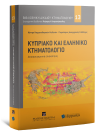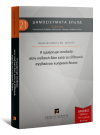K. Kompos, The Doctrine of Necessity in Constitutional Law, 2015

The book deals with the most classical question of Cypriot law: the Law of Necessity. The approach towards such a fundamental issue is innovative, thoroughly detailed and founded on constructively critical argumentation. The author emphasizes the uniqueness of the importance of the Law of Necessity for the Cypriot legal system as well as the international recognition of the Cypriot case law as forming an international prototype. The analysis is based on an overview of the theoretical dimension of the Law of Necessity with reference to Kelsen and on the application of other related legal principles in 19 foreign jurisdictions. In addition, the book examines methodically and exhaustively the case law that applied the reasoning of the landmark decision in Ibrahim. Moreover, the emphasis is placed on the criteria identified in Ibrahim and also on unknown aspects of the case law that preceded that judgment. The adopted approach identifies the need for caution and intense judicial review that is required due to the extreme nature of the Law of Necessity that is to be applied only as the last resort for self-defense. The long application of the Law of Necessity is analyzed with reference to dozens of judgments of the Supreme Court to an extent and depth not attempted before. The work is essential for every student of Cypriot law and is specifically relevant for any lawyer studying or practicing constitutional law. Moreover, the book is useful for each analyst applying the comparative methodology and is also a contemporary contribution in the era of memorandums and the economic crisis that creates unique constitutional conditions.
---------------
Το βιβλίο πραγματεύεται το κλασικότερο ζήτημα του Κυπριακού δικαίου: την εφαρμογή του Δικαίου της Ανάγκης. Η προσέγγιση είναι όμως καινοτόμα και η ανάλυση διεξοδικά λεπτομερής, ενώ χαρακτηρίζεται από εποικοδομητική κριτική διάθεση. Ο συγγραφέας τονίζει την μοναδικότητα της σημασία του Δικαίου της Ανάγκης για την Κυπριακή έννομη τάξη καθώς επίσης και την διεθνή ακτινοβολία της Κυπριακής νομολογίας που αποτελεί διεθνές πρότυπο. Η ανάλυση θεμελιώνεται στην επισκόπηση της θεωρητικής διάστασης του Δικαίου της Ανάγκης με αναφορά στον Kelsen και στην εφαρμογή άλλων συγγενών άρχων δικαίου σε 19 ξένες δικαιοδοσίες. Επιπλέον, εξετάζεται ενδελεχώς το πλαίσιο εφαρμογής της κρίσιμης απόφασης Ibrahim και εντοπίζονται τα σχετικά κριτήρια καθώς και επίσης άγνωστες πτυχές της νομολογίας που προηγήθηκε. Η προσέγγιση εντοπίζει την ανάγκη για επιφυλακτικότητα και επαυξημένο δικαστικό έλεγχο που απαιτείται ένεκα της ακραίας φύσης του Δικαίου της Ανάγκης που βρίσκει εφαρμογή μόνο ως το ύστατο μέτρο αυτοάμυνας. Η μακρά σε διάρκεια εφαρμογή του Δικαίου της Ανάγκης αναλύεται με αναφορά και εξέταση δεκάδων αποφάσεων του Ανωτάτου Δικαστηρίου σε βαθμό και βάθος που δεν επιχειρήθηκε στο παρελθόν. Το έργο είναι απαραίτητο για κάθε μελετητή του Κυπριακού δικαίου και ειδικά για κάθε νομικό που ασχολείται με το συνταγματικό δίκαιο. Επιπλέον, το βιβλίο είναι χρήσιμο και για κάθε αναλυτή που εφαρμόζει τη συγκριτική μεθοδολογία και είναι τέλος επίκαιρο για την εποχή των μνημόνιων και των ειδικών συνταγματικών συνθηκών.
Πληροφορίες έκδοσης
Πίνακας περιεχομένων +-
Acknowledgements
Table of Cases
Chapter One - Introducing the Study
1. The Nature of the Study: Purpose, Organisation and Argumentation
2. Methodological and Analytical Realisations
3. Other Useful Clarifications
Conclusion
Chapter Two - The Theoretical Foundations of the Doctrines of Necessity and Effectiveness
Introduction
1. The Doctrines of Necessity and Effectiveness: the Kelsenian Influence
1.A. Kelsen v Locke, Hart, Austin and Carl Schmitt: the Limits of Constitutionalism
1.B. The Kelsenian Theory of Law and Obvious Misconceptions About It
1.C. The Leading Case Law on Kelsen: Dosso, the Fallacy and its Redemption
2. The Necessity and Effectiveness Principles: Nature, Justification, Prerequisites and Constitutional Positioning
Conclusion
Chapter Three - The Comparative Experience with the Doctrines of Necessity and Effectiveness
Introduction
1. Pakistan and the Doctrines of Necessity and Effectiveness
1.A. The Early Case Law: Khan, Patel and Special Reference No 1 of 1955
1.B. The Dosso Case and its Denunciation in Jilani
1.C. The Bhutto Decision: An Example of Conceptual Distortion
1.D. The ‘Modern Case Law’: Benazir Bhutto and the Three Musharraf Cases
2. The Doctrines of Necessity and Effectiveness in Other Jurisdictions
2.A. The Nigerian Experience
2.B. A Collection of Kelsenian Experience: Uganda, Lesotho and Seychelles
2.B.A. Kelsen Finds Refuge in Uganda
2.B.B. The Lesotho Jurisprudence
2.B.C. Seychelles and Kelsen
2.C. Grenada and Southern Rhodesia: Let’s Talk About Necessity
2.C.A. Grenada Lost in Translation
2.C.B. Southern Rhodesia and Necessity: the Lasting yet at the end Qualified Influence of Dosso and Kelsen
2.D. The Limited Application of Necessity: Manitoba and US Civil War Cases
2.D.A. Manitoba and Necessity
2.D.B. US Civil War Cases and Necessity
3. The Fijian Experience: Doctrinal Clarity at Last
Conclusion
Chapter Four - The Cypriot Constitutional Context and the Constitutional Sclerosis
Introduction
1. The Cypriot Constitutional Context
1.A. The Constitutional Roots
1.B. Constitutional Provisions and their Application
2. The Period of Constitutional Normality: Certain Important Judgments
3. The Collapse of the System
Conclusion
Chapter Five - Ibrahim and the Start of a New Era for Cyprus and for the Doctrine of Necessity
Introduction
1. Introducing Ibrahim
1.A. Factual and Legal Context
1.B. The Argumentation by Berberoglou
2. The Decision in Ibrahim as the Combination of Three Judgments
2.A. The Judgment by Vassiliades J. and the Doctrine of Necessity
2.B. The Judgment by Josephides J. and the Doctrine of Necessity
2.C. The Judgment by Triantafyllides J. and the Doctrine of Necessity
3. Other issues of Ibrahim interlinked with the Doctrine of Necessity
Conclusion
Chapter Six - The Application of Ibrahim: Elasticity and Lack of Systematisation
Introduction
1. The Doctrine of Effectiveness and its Absence in the Cypriot Context
2. ‘Independent’ Administrative Decisions
3. Legislative Measures and the Public Service Commission
4. Other Legislative Measures and the Doctrine of Necessity: Flexibility and Low Intensity of Review
5. An Example of Retroactive Application of Ibrahim: A Step Too Far?
6. Applying a High Intensity Standard of Review
7. The Doctrine of Necessity and Fundamental Rights
8. Constitutional Amendment and the Doctrine of Necessity
Conclusion
Epilogue
Bibliography





















